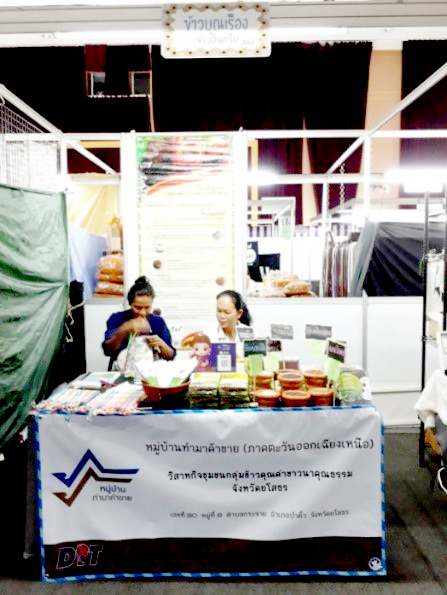Business Potential Development of Trading Village for Khaw Khunkha Chawna Khunatham Community Enterprise, Yasothon Province
Main Article Content
Abstract
This study aims to analyze the operational status and business model, which can activate the business potential of Khaw Khunkha Chawna Khunatham Community Enterprise, thus enhancing business with strength, sustainability and competitiveness. The participation between researchers, community leaders and members of the enterprise group was carried out during the research process purposely to share and exchange knowledge. The data of the community enterprise was collected for SWOT analysis and business model creation in order to define strategies and identify important factors in business operations. By joining the project, the community attended training courses and performed study visits that developed capacity in business management for community leaders and members of the enterprise. The community also learns to develop local products and expand their distribution channels both online and offline; hence improving their business skills and competitiveness. The results of the research process are as follows. 1) The products are improved while distribution channels and media used in public relations extended, resulting in more customers and higher incomes. 2) The members have advanced their knowledge and are aware of the importance of online marketing. 3) Accounting system has been enhanced, making it easier for auditing and convenient for production planning and marketing. 4) The local rice mill became standardized, thereby enabling the community enterprise to process high-quality rice, thus increasing business income. In conclusion, our findings indicate that the analysis and improvement of the operational status and business model enhanced the strength, sustainability and competitiveness for the Khaw Khunkha Chawna Khunatham Community Enterprise.
Article Details

This work is licensed under a Creative Commons Attribution-NonCommercial-NoDerivatives 4.0 International License.
Area Based Development Research Journal values copyright protection and licensing to safeguard author rights and facilitate the appropriate dissemination of research. Our policies ensure openness, accessibility, and attribution. Authors retain copyright ownership, and articles are published under a Creative Commons Attribution License (CC BY), allowing sharing, adaptation, and proper attribution. Authors have the freedom to publish under the CC BY license, granting broad reuse and distribution permissions. The journal supports posting articles on third-party repositories, adhering to institutional and funding restrictions. Author guidelines detail copyright and licensing requirements, empowering authors with knowledge about their rights and responsibilities. These policies cultivate an environment of collaboration, openness, and responsible sharing, benefiting authors and the research community while honoring intellectual property rights.
References
Boonrattanakittibhumi, C. (2014). Capacity entrepreneur of community enterprises in Thailand. Journal of Social Academic, 7(3), 103-117. (in Thai).
Chaimuang, N. (2015). Development of community enterprise management to sustainable self-reliance. Payap University Journal, 25(1), 15-39. (in Thai).
Chuea-Insoong, M., Klaiklang, R., & Nimkoetphol, S. (2019). Tung Thong organic rice group community enterprise management accomplishment toward decreasing their expenses (expenditure) in U-thong district, Suphan Buri province. FEU Academic Review, 13(1), 69-85. (in Thai).
Department of Agricultural Extension. (2005). Community enterprise promotion act, B.E. 2548. Bangkok: Office of the Community Enterprise Promotion Board Secretariat. (in Thai).
Department of Industrial Promotion. (2009). Management system standards for community enterprise. Retrieved March 20, 2019, from http://library.dip.go.th. (in Thai).
Department of Internal Trade. (2018). Study report of forms and guidelines for trading village. Retrieved August 8, 2019, from https://www.dit.go.th/Content.aspx?m=101&c=23603. (in Thai).
Kasornbua, T. (2015). Strategies to increase market competition potential for new entrepreneurs (baskets type) in the ASEAN market. Case study of Ban Bang Pluang rice farmers communities enterprises, Tambon Bang Pluang, Ampher Ban Sang, Prachinburi province. Journal of Humanities and Social Sciences, Burapha University, 23(41), 225-247. (in Thai).
Nuanpradit, S. (2018). The development of the bookkeeping and product and service costing systems for Sangyod rice community enterprise: A case study of Baan Khao Klang, Khuan Khanun district, Pattalung province. Journal of Management Sciences, 35(2), 27-54. (in Thai).
Office of the National Economics and Social Development Council. (2019). National economic and social development plan no. 12. Bangkok: Office of the Prime Minister. (in Thai).
Osterwalder, A. & Pigneur, Y. (2010). Business model generation: A handbook for visionaries, game changers, and challengers. New Jersey: John Wiley & Sons.
Patrawart, J., Senthong, W., Yothasmutr, S., Sriurai, S., Singharerk, W., Rattanakeit, C., ... Chalothorn, N. (2006). Complete research report on cooperative movement development project in 36 provinces. Retrieved August 13, 2019, from https://elibrary.trf.or.th. (in Thai).
Pradit, K. (2018). The development of distribution channels of rice products through the electronic-commerce system for Bor-Khor’s housewife’s group, the community enterprise in Takbai district, Narathiwat province. The Journal of Social Communication Innovation, 6(2), 152-164. (in Thai).
Pongpit, S. (2007). Community enterprise: Mechanisms of local economy. Bangkok: Edison Press Products Co Ltd. (in Thai).
Promsaka Na Sakolnakorn, T. & Sungkharat, U. (2014). Development guidelines for small and micro community enterprises in Songkhla lake basin. Journal of Humanities and Social Sciences, 10(1), 97-122. (in Thai).
Thisawet, R., Somboon, S., & Ngeoywijit, S. (2017). The strategies for development organic rice production system following selfsufficiency economy philosophy of the Ton-Kla enterprise of Amnat Charoen Groups. Journal of Humanities and Social Sciences, Ubon Ratchathani Rajabhat University, 8(Speical), 106-121. (in Thai).
Yasothon Provincial Agricultural Extension Office. (2018). Chawna Khunatham Community Enterprise. Retrieved August 8, 2019, from http://www.organicyasothon.com/. (in Thai).


